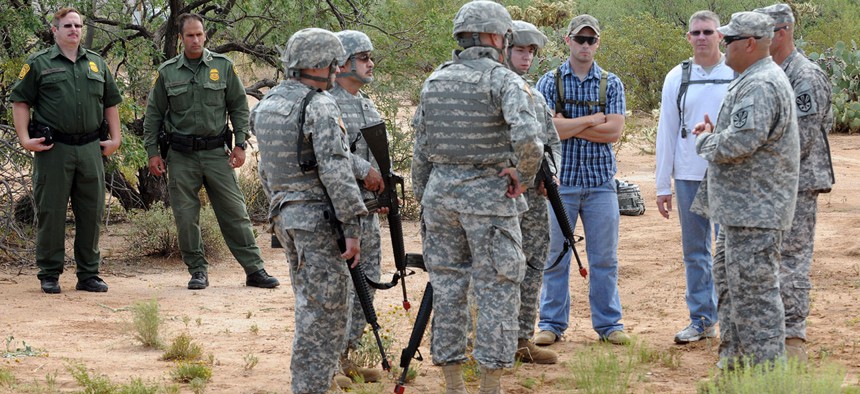
Border Patrol agents observe Arizona National Guard Soldiers training in Arizona in 2010. Staff Sgt. Jim Greenhill/Defense Department file photo
Analysis: By Sending Troops To The Mexico Border, Trump Repeats a Costly Obama Mistake
"Operation Phalanx," an ineffective Obama-era plan, cost millions and had little impact.
Donald Trump plans to send 5,000 troops to the country’s southern border, a massive increase from the 800 originally planned, in order to secure legal ports of entry, the Wall Street Journal reports.
The troops are expected to remain there through mid-December, as a caravan of migrants seeking asylum from Central America works its way to the U.S. border with Mexico.
Sending troops to the U.S.’s nearly 2,000-mile-long border with Mexico isn’t a new idea, as Quartz wrote earlier this year, when the White House asked that thousands of National Guard troops head south. In fact, both presidents Barack Obama and George W. Bush tried it.
Both times, U.S. diplomats, local business people, and lawmakers called it an expensive failure (paywall).
In July of 2010, Obama ordered up “Operation Phalanx,” dispatching 1,200 National Guard troops to the border. The Obama order was an extension of “Operation Jump Start,” a 2006 Bush policy that sent 6,000 National Guard troops to the U.S.-Mexico border, where they did everything from help seize drugs to rescue a drowning Central American woman…
Operation Phalanx cost $145 million for 14 months, while Operation Jump Start cost $1.2 billion over two years. Both operations took resources from other Department of Defense projects, while failing to establish a transparent US-Mexico border security policy, the Government Accountability Office (GAO) said in a critical 35-page report. State Department officials worried the operations would hamper their cooperation with Mexican law enforcement authorities, the report said.
One of the biggest hurdles getting in the way of troops’ effectiveness is that federal soldiers are not usually allowed to act like law enforcement in the U.S., as the GAO report notes. Troops that are federally funded and under the command of the Secretary of Defense, are “Title 10 status,” which means they are “generally prohibited from direct participation in law enforcement activities without proper statutory authorization.”
The Customs and Border Protection is responsible for upholding immigration law. The new troops on the border aren’t expected to enforce those laws either, a CBP official told the Journal. Instead, the highly-trained U.S. military personnel are expected offer logistical support, like building tents.






